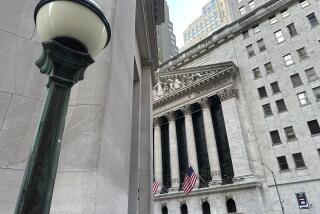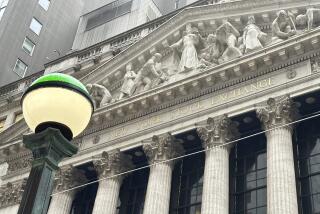As Stocks Surge, so Do Bond Yields, Signaling Market Reversal, Some Say
- Share via
Is the bull market for Treasury bonds over?
That’s what a growing number of investors and portfolio managers are wondering as yields on government debt have surged in the last week while stocks have rallied. Thursday, the yield on the benchmark 10-year T-note leaped to 4.2% from 4.05% the day before. Since Oct. 9, it has surged from a generational low of 3.57%.
“We probably saw the inflection point last week,” said Richard Hoey, chief investment strategist at Dreyfus Corp., who believes stocks are likely to outperform Treasury bonds over the next year or two, reversing the trend of recent years.
That could sting investors who have piled into bond mutual funds in record numbers this year, analysts say.
“What the bond market is telling you is that the irrational ‘fear premium’ is starting to exit,” said Bill Hornbarger at A.G. Edwards & Sons in St. Louis. “People need to be very careful because bonds as an asset class look very rich right now.”
Among big bond funds, Pimco Total Return has lost 1.5% since Oct. 9 and Vanguard Total Bond Market has lost 1.8%, according to Bloomberg News, offering a taste of what can happen when bond yields reverse course suddenly.
Bond yields have risen as investors shift money out of low-yielding Treasury securities and into stocks, helping Wall Street post big gains over the last week. In addition, with the U.S. economy still growing, hopes are fading for another Federal Reserve interest rate cut this year.
Many institutional investors such as CalPERS, the giant California public pension fund, are shifting their asset allocations away from bonds and into stocks or “alternative investments” such as venture capital, rebalancing their portfolios in light of the powerful run for bonds.
Even billionaire Warren Buffett is rumored to be shifting money from bonds to stocks, according to published reports.
The fear is not about the safety of interest payments or principal repayment because there is no question the government will make good on what it owes. But if rates continue backing up, the market value of Treasury securities bought at recent prices and yields would plunge. That could mean losses for investors forced to sell before the securities mature, or for investors holding bond mutual funds loaded with Treasuries.
A further spike in yields also would pull interest rates higher, affecting consumer and corporate borrowers. It could slow the flurry of mortgage refinancing that has helped bolster consumer spending. However, it could provide some relief for savers bedeviled by low returns on money market accounts and other savings vehicles.
Still, although many strategists believe the U.S. economy is recovering, the data remain mixed, and there is no assurance that the stock market surge has staying power. In the fourth quarter of 2001, bond yields rose even more during the stock market’s “head fake” rally -- until it fizzled in early January. Newport Beach-based Pimco, for one, believes stocks “are still in an overall bear market,” said portfolio manager Mark Kiesel.
Mideast tensions and the potential for rising energy prices are among the factors that could derail stocks, analysts say. If the U.S. slips back into recession, Treasury yields probably will fall again, and bond total returns -- interest plus price appreciation -- would be all the more likely to score their third straight winning year over stocks.
That winning streak has pulled huge sums into fixed-income investments. Bond funds took in a net $104 billion this year through August, compared with the record $88 billion for all of last year, based on the latest official data.
Despite the popularity of fixed-income funds, some investors agree with the pros, saying it may be too late to jump on the bond bandwagon.
“I wouldn’t want to go into bonds right now,” said Greg Orloff, a retired consultant from Santa Monica. “It’s the kind of thing where you say, ‘I wish I would’ve been there for the ride, but now is not a good time.’ ”
Analysts applaud investors who are using bonds to diversify their portfolios. But they say performance chasers could get burned, just like those who piled into tech stocks 2 1/2 years ago.
“In the late 1990s stock investors came to expect 15% per year and they got a rude awakening,” said Scott Berry, an analyst at Morningstar Inc. “Hopefully the same thing doesn’t happen with the bond market.”
Times staff writer Debora Vrana contributed to this report.
More to Read
Inside the business of entertainment
The Wide Shot brings you news, analysis and insights on everything from streaming wars to production — and what it all means for the future.
You may occasionally receive promotional content from the Los Angeles Times.










